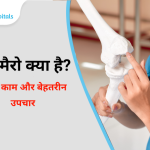Cancer is one of the most serious health conditions that can affect people at any stage of life. While there is no guaranteed way to prevent cancer completely, leading a healthy lifestyle and taking preventive measures can significantly reduce the risk of developing the disease. Understanding how to lower your risk and maintain good health is essential in the fight against cancer.
At Raj Hospitals, we believe in the power of prevention. With the right knowledge, lifestyle changes, and early detection, we can help you stay healthier and lower your chances of facing cancer. In this blog, we’ll explore the best ways to prevent cancer and offer tips for living a cancer-free life.
What is Cancer?
Before we dive into prevention, it’s important to understand what cancer is. Cancer refers to a group of diseases that occur when abnormal cells in the body grow uncontrollably. These cells can form tumors or spread to other parts of the body. There are many different types of cancer, such as breast cancer, lung cancer, prostate cancer, and skin cancer.
While the exact causes of cancer are not always clear, there are several known risk factors, such as genetics, lifestyle choices, and environmental factors. The good news is that many of these factors are within our control. By adopting healthy habits and making mindful decisions, we can significantly reduce our cancer risk.
The Best Ways to Prevent Cancer

Here are some simple, effective ways to reduce your risk of cancer and promote a healthier lifestyle:
1. Maintain a Healthy Diet
A balanced diet is one of the best ways to protect yourself against cancer. Certain foods have been shown to have cancer-fighting properties, while others can increase the risk of cancer.
What to eat:
- Fruits and Vegetables: A diet rich in fruits and vegetables provides essential vitamins, antioxidants, and fiber. Cruciferous vegetables like broccoli, cauliflower, and kale are especially beneficial in reducing cancer risk.
- Whole Grains: Whole grains such as oats, brown rice, and quinoa contain fiber and nutrients that support overall health and reduce the risk of colorectal cancer.
- Lean Proteins: Opt for lean proteins, such as chicken, fish, and legumes, while limiting red meat and processed meats, which can increase the risk of certain types of cancer.
- Healthy Fats: Incorporating healthy fats from sources like olive oil, avocados, and nuts helps reduce inflammation and supports the immune system.
What to avoid:
- Processed Foods: Highly processed foods, especially those high in sugar, fat, and artificial additives, should be limited. These can increase the risk of obesity, diabetes, and cancer.
- Excessive Alcohol: Drinking alcohol in moderation is key. High alcohol consumption is linked to increased risks of liver, breast, and colorectal cancer.
Maintaining a healthy diet not only helps prevent cancer but also promotes overall well-being.
2. Exercise Regularly
Physical activity is essential for reducing cancer risk. Regular exercise helps maintain a healthy weight, boosts immune function, and improves circulation, all of which can help prevent cancer.
Benefits of exercise:
- Weight Management: Obesity is a significant risk factor for many cancers, including breast, colon, and endometrial cancer. Exercise helps keep your weight in check.
- Hormonal Balance: Exercise can help regulate hormones, especially estrogen, which is linked to an increased risk of breast and ovarian cancers.
- Boosts Immunity: Physical activity strengthens the immune system, which can help fight off cancerous cells.
Aim for at least 30 minutes of moderate exercise, such as walking, cycling, or swimming, at least five times a week. Exercise doesn’t have to be intense, but regular movement is key to long-term health.
3. Avoid Smoking and Secondhand Smoke
Smoking is one of the leading causes of cancer worldwide. It is directly linked to lung cancer and is also a significant risk factor for cancers of the mouth, throat, pancreas, bladder, and more.
If you smoke, quitting is one of the most important steps you can take to reduce your cancer risk. There are various smoking cessation programs and therapies available to help you quit successfully.
Even if you don’t smoke, exposure to secondhand smoke can increase your cancer risk. Try to avoid places where people are smoking, and encourage loved ones to quit for their health and yours.
4. Limit Sun Exposure and Protect Your Skin

Skin cancer is one of the most common types of cancer, but it is also one of the most preventable. The main cause of skin cancer is overexposure to ultraviolet (UV) rays from the sun or tanning beds.
Tips to protect your skin:
- Wear Sunscreen: Apply broad-spectrum sunscreen with SPF 30 or higher every day, even on cloudy days.
- Seek Shade: Limit sun exposure between 10 a.m. and 4 p.m., when UV rays are strongest.
- Wear Protective Clothing: Opt for hats, sunglasses, and long-sleeved shirts when you’re outdoors.
- Avoid Tanning Beds: Tanning beds increase the risk of melanoma, a dangerous form of skin cancer.
Taking these precautions can help reduce the risk of skin cancer and keep your skin healthy for years to come.
5. Get Vaccinated
Certain viruses, such as the human papillomavirus (HPV) and hepatitis B, can increase the risk of cancer. Vaccines are available that can help protect you from these viruses.
- HPV Vaccine: The HPV vaccine can protect against certain types of HPV, which can cause cervical, anal, and other cancers. It’s recommended for both boys and girls starting at age 11 or 12.
- Hepatitis B Vaccine: The hepatitis B vaccine can reduce the risk of liver cancer by preventing hepatitis B infection.
By getting vaccinated, you’re taking a proactive step to protect yourself from cancer-causing viruses.
6. Get Regular Screenings and Check-ups
Early detection is key to successfully treating cancer. Regular screenings and check-ups can help detect cancer in its early stages when it is most treatable. Speak with your doctor about the appropriate screenings for your age, sex, and family history. Common cancer screenings include:
- Breast Cancer: Mammograms for women starting at age 40 or earlier if there is a family history of breast cancer.
- Cervical Cancer: Pap smears and HPV tests for women starting at age 21.
- Colorectal Cancer: Colonoscopies for men and women starting at age 50 or earlier if there is a family history.
- Prostate Cancer: Prostate-specific antigen (PSA) tests and digital rectal exams for men starting at age 50 or earlier if there is a family history.
Regular check-ups with your healthcare provider can help you stay on top of your health and catch any potential issues early.
7. Maintain a Healthy Weight
Being overweight or obese is a risk factor for several types of cancer, including breast, colon, and kidney cancer. Maintaining a healthy weight reduces your risk and promotes better overall health.
Tips for weight management:
- Eat a Balanced Diet: Focus on nutrient-dense foods and limit processed and sugary foods.
- Exercise Regularly: As mentioned earlier, physical activity is key to weight management.
- Get Enough Sleep: Lack of sleep can lead to weight gain and other health issues. Aim for 7-9 hours of sleep each night.
Achieving and maintaining a healthy weight is crucial for reducing cancer risk and improving overall well-being.
8. Reduce Exposure to Environmental Toxins
Environmental toxins, such as chemicals, pollutants, and industrial waste, can increase cancer risk. Although it’s impossible to avoid exposure to all environmental toxins, there are steps you can take to minimize it:
- Avoid exposure to harmful chemicals at home or in the workplace.
- Limit exposure to pesticides and herbicides by choosing organic produce.
- Check for radon in your home, especially in basements. Radon is a cancer-causing gas that can accumulate indoors.
By being mindful of environmental risks, you can reduce your exposure to potential cancer-causing toxins.
Conclusion
Cancer is a serious disease, but there is much we can do to reduce our risk. By adopting a healthy lifestyle, eating a balanced diet, staying active, avoiding smoking, and taking preventative measures, we can significantly lower the chances of developing cancer.
At Raj Hospitals, we are committed to helping you live a healthy life. Regular check-ups, early detection, and proper treatment can make all the difference in preventing and managing cancer. If you’re concerned about your health or cancer risk, don’t hesitate to schedule a consultation with one of our specialists.
Take control of your health today – visit Raj Hospitals for expert care, preventive advice, and cancer screenings. Your health is our priority!
.svg)










